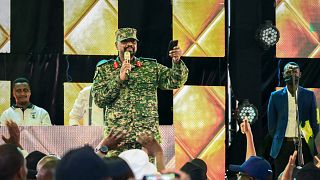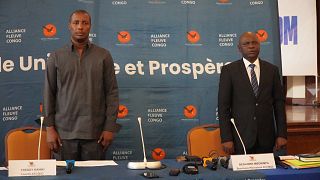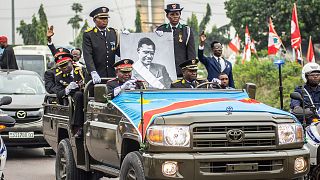Democratic Republic Of Congo
Democratic Republic of Congo’s main opposition party denounced president Joseph Kabila’s newly appointed government under prime minister Bruno Tshibala, which they say undermines a previous agreement.
Kabila, in power since 2001, struck a deal in December with Congo’s main opposition bloc to stay on after his mandate expired provided he held elections by the end of 2017.
But talks to implement the deal broke down in March when Kabila refused to commit to the bloc’s choice of prime minister.
This is the second nomination of a prime minister. The opposition also rejected the appointment of Congo opposition figure Samy Badibanga, who was named in November last year under a power-sharing deal. The opposition called the nomination a “provocation” at the time.
In the capital Kinshasa, many residents say they are skeptical that the new government will change the current political impasse.
“This so called government is a bad idea. As you know, Kabila does not want to leave power. All these are tactics that are going on around the announcement of Tshibala’s (current prime minister) government or a Badibanga (former prime minister) government. All these are distractions that they are using to stay in power. There is nothing new,” said one resident Theo Tshamala.
“I don’t know how a new government will handle the two biggest problems in just eight months, namely organizing the elections and also tackling the challenges that the people are facing,” added another Kinshasa resident, Jean Claude Mputu.
Despite resistance to Kabila remaining in power, he has successfully co-opted large portions of the opposition.
The new prime minister, Tshibala, named last month, is a former member of the country’s largest opposition party and other opposition leaders received ministerial posts too.
Ruling majority spokesperson Alain Atundu Liongo dismissed the critics, saying that the new government is ready to work with the opposition.
“The ruling majority is invested in the success of this government, especially regarding two major objectives. We need to finish with the process of organising elections as agreed. We also need to insure that the Congolese people live in the best social conditions as well as security for their own well being. We also need to pursue at national level, policies that will improve the country’s economy,” Liongo added.
The roughly 60 ministers and vice-ministers that were named are mainly holdovers from the previous government and key ministries – including foreign affairs, interior, justice and mines – remain in the hands of Kabila loyalists.
Political tensions are high after security forces killed dozens during protests over election delays last year. Worsening militia violence in recent months has also raised fears of a backslide toward the civil wars of the turn of the century that killed millions.
Kabila’s opponents suspect he intends to repeatedly delay elections until he can organise a referendum to let himself stand for a third term, as his counterparts in neighbouring Congo Republic and Rwanda have done.
Kabila denies those accusations, saying the election delays are due to challenges registering millions of voters and budgetary constraints.
“The accord legitimised our institutions, but that’s no longer the case today. All that is happening at the moment is just a distraction, and when the time comes there will be consequences, I can promise you that. As someone who is responsible for UDPS, I can tell you that Kabila is responsible of all of this, because he is behind this. Do not think that other people are behind this, it’s all Kabila,” said the opposition UDPS spokesperson, Augustin Kabuya.
The new government faces a number of stern tests. Congo’s franc currency has lost half its value since last year and authorities are struggling to mobilise the resources needed to hold the election by the end of the year.
It will also enter office amid controversy over the burial of long-time opposition leader Etienne Tshisekedi, who died in Belgium in February.
His political party, the UDPS, had planned to bury him on Friday (May 12) at its headquarters in the capital, Kinshasa, but the provincial government has rejected the planned site.
“The governor needs to have the courage to tell you the truth. His hands are tied, he cannot make this decision himself. He’s only just a figure in this whole thing. We spoke to the governor. If he was serious in his proposal, why didn’t he condemn his political family when he gave his go ahead to UDPS, while his political family gave another view? Why did he change his mind? He had to find a way to cover up, that’s all we can say right now. Everything that the governor is saying right is just imagined scenarios to please his political family,” said Kabuya.
President of the UDPS’s Brussels wing, Katumba Tchiowa Ngoy told Reuters the party would delay repatriating the body and that it would be brought back in “12 to 15 days.”
Reuters













01:00
Pix of the Day: July 3, 2025
01:08
DRC extends ban on cobalt export for another three months
Go to video
Protesters gather in Ivory Coast, demand Thiam's return on electoral list
01:07
WHO says the mpox outbreak remains a public health concern
01:00
Ivory Coast: opposition candidates barred from electoral lists
Go to video
Ugandan lawmakers bring back military courts' ability to try civilians